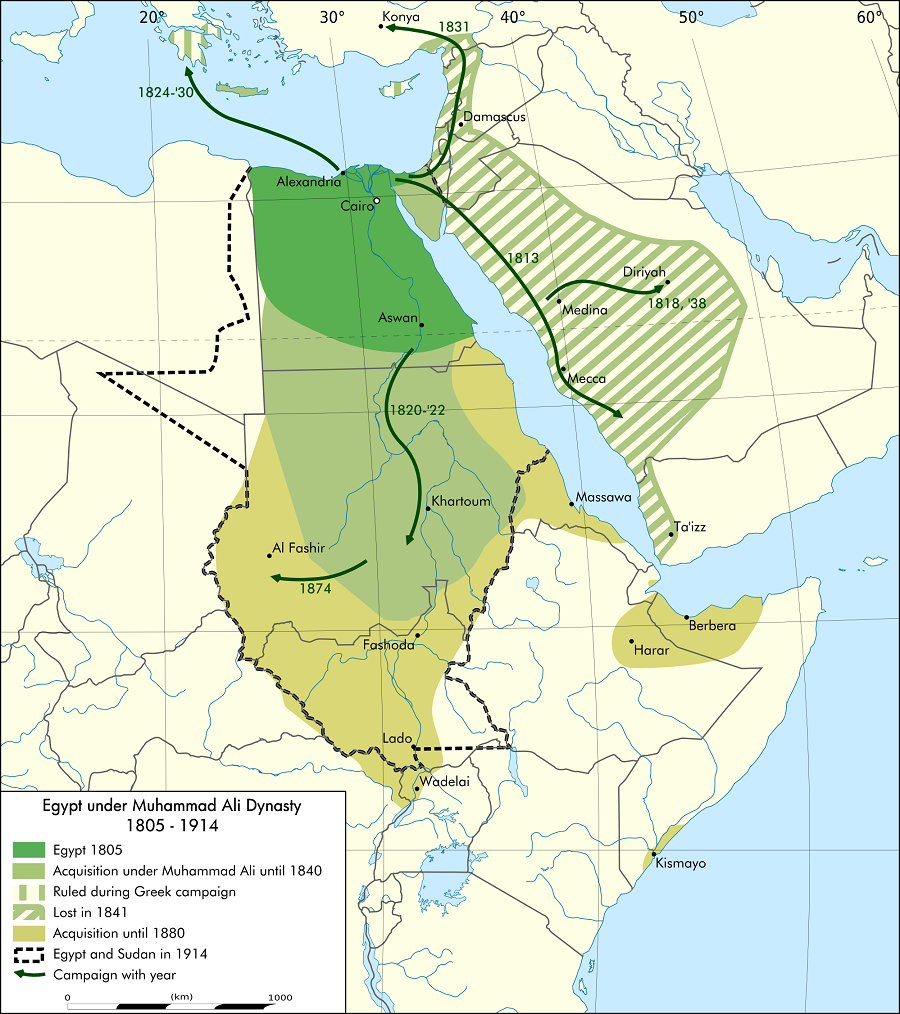The demand, backed as it was by the army with an open threat of extreme violence, was irresistible.
Continuing Great Britain Expands Control of Egypt,
our selection from History of England by James Franck Bright published in 1893. The selection is presented in seven easy 5 minute installments. For works benefiting from the latest research see the “More information” section at the bottom of these pages.
Previously in Great Britain Expands Control of Egypt.

Gambetta urged upon the English Ministry the presentation of a joint note, assuring the Khedive that he might “trust to the united efforts” of England and France “to withstand the causes of the external or internal complications threatening the existing regime in Egypt.” Such a note was not in accordance with the avowed policy of England. In issuing it the Ministry went beyond their mandate from Europe; they took a step that might easily cause difficulties with other Powers, and that was contrary to the prevalent feeling in favor of assuming as little responsibility as possible in the direct government of Egypt. After some hesitation, however, the Government yielded to their fear of breaking with France, and the joint note drawn by Gambetta was sent to the Khedive, with the disastrous results already mentioned.
It also gave an opportunity to the Sultan to protest against the unauthorized action of the two Powers in a matter which properly belonged to him as sovereign. The protest was disregarded by Gambetta; but it was not, apparently, without its effect on Lord Granville, for in January he wrote to Lord Lyons that he wished to maintain the rights of sovereign and vassal as between the Sul tan and the Khedive, and that, if armed intervention were necessary, Turkish intervention, under close restrictions, would be the most desirable form. The idea of restoring order by the inter position of Turkey was, however, quite contrary to the views of France; affairs in Tunis had lately strained almost to extremity its good relations with the Porte. The sudden fall of Gambetta’s Ministry (January 27, 1882) somewhat altered the position; the desire for active intervention disappeared, and the dread of Turkish intervention became even stronger. A rift had obviously opened between the policy of England and that of France.
Meanwhile events in Egypt were hastening onward. A serious incident occurred in May, 1882, leading to a breach between the Khedive and his Ministers. A large number of officers had been rewarded for their revolutionary services by promotion, but many Circassians had been omitted from the list of the favored. They were now accused of having formed a conspiracy to put Arabi to death. About fifty were apprehended. They were tried in secret, and undefended, and the greater part of them were exiled for life. It is said that this was but the beginning of a general proscription, and that three hundred other names had been added to the list of victims. The Khedive commuted the sentences of the Circassian officers, and there can be little question as to the rightfulness of this course. But there was a fatal error in the manner in which the Khedive acted; he had been too evidently under the influence of the English political agent, who had even insisted on being present when the pardons were signed. This obvious interference of the foreigners produced a complete breach between the Khedive and his Ministers. On May 25th, immediately after this violent quarrel, emboldened by the arrival of ironclads in Alexandria, the French and English agents, declaring that they acted in the name of their respective Governments, presented the so-called ultimatum, demanding the exile of Arabi, with two of his officers, and the resignation of the Ministry. The Khedive received the ultimatum without the knowledge of his Ministers. In thus acting he had no doubt infringed the constitution. His Ministry, already estranged, seized the opportunity, and at once resigned (May 26th). Great was the excitement caused by this step. From the army, from the Ulemas, and from the people petitions streamed in on the Khedive demanding the restoration of the fallen national Ministry. The demand, backed as it was by the army with an open threat of extreme violence, was irresistible. Arabi and his friends returned in triumph (May 27th) and were absolute masters of the situation. The threat was no idle one, for on May 30th, Mr. Cookson, the English Consul-General, had written to Lord Granville, “Alexandria is in continued danger of being stormed by the soldiery.” On June 11nth the danger became a reality. There was a popular outbreak, in which Mr. Cookson was severely wounded, and more than two hundred Europeans were killed. It became necessary to take measures for the restoration of order.
Already (May 21st), in view of the possible danger to the lives of the Europeans, French and English ironclads had been dispatched to Alexandria. While agreeing in this step, the French Ministry had made it a condition that the Porte should abstain from interference, but they had so far come into the views of England that they had waived their objection to a European conference. The invitations were actually issued on June 1st, but not before Sir Edward Malet had tried the effect of an appeal to Turkey. He requested the Sultan to use his authority as suzerain for the restoration of order. Nothing, except a European conference, could be more distasteful to the Porte, which had hoped to increase its influence in Egypt by covert support of Arabi. To stop this action seemed suicidal; but to be obliged to do so by the combined action of Europe would be worse. In dread therefore of the threatened conference, the Porte dispatched a commissioner, Dervis Pacha, who reached Egypt just before the Alexandrian massacre. His presence produced no good result. He refused to take any responsibility, as he was without troops, and instead of exerting his authority for the active suppression of disturbance, he actually allowed the duty of restoring order after the massacre to be placed in the hands of Arabi himself. It was plain that, so far from exerting any controlling influence, the Turkish suzerainty to which Lord Granville had trusted was a mere empty name, without influence either moral or physical. Nothing seemed left but the use of forcible intervention, ordered or allowed by the conference.
| <—Previous | Master List | Next—> |
More information here and here, and below.
|
We want to take this site to the next level but we need money to do that. Please contribute directly by signing up at https://www.patreon.com/history

Leave a Reply
You must be logged in to post a comment.